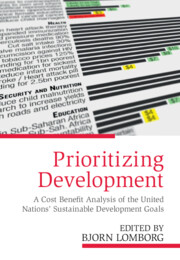 Prioritizing Development
Prioritizing Development Published online by Cambridge University Press: 30 May 2018
Introduction: Illicit Financial Flows
This chapter covers the important issue of illicit financial flows (IFFs) and ways in which they may be addressed. The Sustainable Development Goals (SDGs) target to curtail IFFs (16.4) currently has no defined indicators. Discussions are ongoing, but there is a risk that policy focus is lost. The proposal made here is for a set of three indicators that offer clear policy prioritization and are likely to exhibit very high benefit-cost ratios.
The limitations of cost-benefit analysis should be kept in mind throughout. The power of the SDGs’ predecessor, the Millennium Development Goals (MDG) framework, lay in its contribution to setting norms rather than in the specifics of individual targets. Most important, perhaps, MDG 3 fixed the still-emerging norm on the need for gender equality – with a reach that has gone far beyond the handful of areas in which targets were actually specified.
The value of economic cost-benefit analysis is of second order in comparison to that norm-setting role, and the UN Open Working Group rightly weighed political and social issues highly. Imagine that cost-benefit analysis showed that including the most marginalized 1 percent of populations politically or, in service basic provision, was prohibitively expensive. It is unthinkable that the principle (and norm) of universality would be sacrificed to a more “realistic” 99 percent target – which would effectively formalize a commitment to exclude the most excluded.
Where cost-benefit analysis can play a role, however, is in relation to the other major contribution of the MDGs: the creation of a framework for shared policy prioritization among national and other actors. Two caveats apply: the extent of uncertainties in any assessment should be fully reflected when this analysis is weighed alongside other evidence, and the second-order nature of economic costs and benefits in the political decisions being taken should not be forgotten.
In the current study, a narrowly economic approach provides conservative estimates because although the costs of the proposed targets are measured relatively well, only limited economic benefits are captured (ignoring the potential for political, social, and environmental benefits). In the case of illicit flows, therefore, there is unlikely to be a conflict between cost-benefit analysis and rights-based arguments.
To save this book to your Kindle, first ensure [email protected] is added to your Approved Personal Document E-mail List under your Personal Document Settings on the Manage Your Content and Devices page of your Amazon account. Then enter the ‘name’ part of your Kindle email address below. Find out more about saving to your Kindle.
Note you can select to save to either the @free.kindle.com or @kindle.com variations. ‘@free.kindle.com’ emails are free but can only be saved to your device when it is connected to wi-fi. ‘@kindle.com’ emails can be delivered even when you are not connected to wi-fi, but note that service fees apply.
Find out more about the Kindle Personal Document Service.
To save content items to your account, please confirm that you agree to abide by our usage policies. If this is the first time you use this feature, you will be asked to authorise Cambridge Core to connect with your account. Find out more about saving content to Dropbox.
To save content items to your account, please confirm that you agree to abide by our usage policies. If this is the first time you use this feature, you will be asked to authorise Cambridge Core to connect with your account. Find out more about saving content to Google Drive.